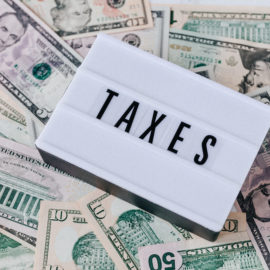
What’s the fastest way to achieve financial freedom? Which expenses should you focus on cutting first?
In Set for Life, Scott Trench reveals how smart spending habits can accelerate your path to financial independence. By targeting your biggest expenses—housing, transportation, food, and insurance—you can dramatically reduce your monthly spending without sacrificing quality of life.
Keep reading to discover practical strategies for cutting your biggest expenses while building wealth for the future.
Your Biggest Expenses
To get started on the path to financial freedom, Trench recommends you first focus on cutting expenses through smart, frugal living. The less you spend early on, the less wealth you need to accumulate later, and the faster you can reach financial freedom.
Trench suggests focusing on four of your biggest expenses: housing, transportation, food, and insurance. He writes that relatively small budget items such as entertainment and clothing aren’t worth stressing over, assuming you’re reasonably frugal.
(Shortform note: For two decades, financial advisers have pushed the myth that giving up small luxuries such as daily lattes is the key to building wealth today. However, research shows that we’re not spending more on small luxuries than people have in the past. Spending on items such as coffee and entertainment has remained steady at 4 to 5% of income since 1980. The bigger issue is that workers today must handle retirement savings on their own, unlike previous generations who could rely on employer pensions that guaranteed retirement income. This shift, combined with major life events such as job loss, emergencies, and divorce, has a much greater impact on wealth than spending on small luxuries.)
Trench provides several tips to cut down your biggest expenses.
Housing: Rent an affordable apartment close to your workplace and split costs with roommates. While the trendiest neighborhood might be alluring, choosing a more affordable area just a few miles away can cut your rent in half.
(Shortform note: If you’re open to more innovative housing options, consider coliving arrangements. These spaces are like adult dorm rooms where you share common areas. They often include utilities, WiFi, cleaning services, community events, and even household essentials in a single rent payment, making budgeting easier than juggling multiple bills with traditional roommates. Coliving is popular among younger people and can cut housing costs by up to 50% compared to renting alone.)
Transportation: Daily car commutes can be expensive, considering gas costs, car repairs, and the countless hours spent in traffic. By living close enough to walk or bike to work, you can save more than $10,000 annually, according to Trench. However, if driving is necessary, opt for a second-hand, fuel-efficient car instead of a new one.
(Shortform note: Your commute impacts more than just your wallet. One study found that biking to work instead of driving or taking public transportation reduces your overall mortality risk by 41%. The benefits of walking to work, while not as dramatic as cycling, are still significant: Walking commuters had a 27% lower chance of developing heart disease compared to drivers. So, choosing to walk or cycle can not only add more money to your wallet, but more years to your life.)
Food: Make your meals at home using budget-friendly groceries, rather than ordering food or dining out frequently. Keeping healthy food readily available can help you avoid convenient, costly takeout orders. However, Trench writes that you can still enjoy an occasional meal out with friends.
(Shortform note: Price comparisons show that while cooking from scratch with grocery store ingredients is the most budget-friendly option, some meal kit services can offer a reasonable middle ground between expensive takeout and traditional grocery shopping when you factor in the convenience and time savings. You could even try a combined approach by selecting meal kits that are more expensive to cook from scratch, while still shopping for basic ingredients that are cheaper to buy in bulk.)
Insurance: For life insurance, Trench recommends term life insurance, which is cheaper than whole life insurance because it only provides coverage for a set time period. This is because once you achieve financial freedom, you’ll have sufficient assets and net worth to self-insure and provide for your family, so you’ll no longer need life insurance coverage.
For health, auto, and other types of insurance, choose high-deductible plans to keep premiums low. As you accumulate savings, you’ll be able to cover those higher deductibles if needed. Trench writes that in the long run, the money saved on premiums would outweigh an occasional hefty bill. He adds that combining high-deductible health plans with health savings accounts (HSAs) can also provide tax benefits that save you money.
| Understanding Insurance Basics Trench doesn’t explicitly define basic insurance terms such as premium and deductibles, but guides to picking health insurance plans elaborate on these terms: Premiums are the fixed monthly payments you make to have insurance, and deductibles are the amount you must pay out-of-pocket for services before insurance starts covering costs. When shopping for term life insurance, investor and TV personality David Chilton recommends looking for policies that are both renewable and convertible. In The Wealthy Barber, he explains that renewable term life insurance allows you to renew the policy when it expires without having to take another medical exam to prove you’re still insurable. Convertible policies let you convert the policy to a cash-value plan offered by the same insurance company if you end up needing coverage beyond the renewal age limit, which is typically 65 or 70. In I Will Teach You to Be Rich, Ramit Sethi elaborates on health savings accounts, explaining that they’re only available to people with high-deductible health insurance plans. HSAs offer a unique triple tax advantage that makes them valuable for both health care and retirement planning: When you put money in an HSA, you don’t pay taxes on your contributions, you don’t pay taxes on investment growth, and you don’t pay taxes when using the money for medical expenses. You can even invest your HSA money in the stock market, similar to a retirement account, letting it grow over time instead of sitting idle in a regular savings account. |
3 Habit & Mindset Changes to Help You Cut Spending
Trench argues that it’s better to focus first on saving rather than earning for two reasons. First, you can cut expenses right away, whereas earning more money takes more time and extra commitment. Second, the money you save by cutting expenses isn’t taxed, whereas the money you earn gets taxed, so it’s more efficient to save money than to earn extra taxable income.
(Shortform note: Although focusing on cutting expenses can help you achieve financial freedom faster, some experts say you shouldn’t let your focus on saving get in the way of experiences and relationships. In Die With Zero, hedge-fund manager Bill Perkins argues that you should spend reasonably to live a more fulfilling life—especially when you’re young. This is because some experiences are most enjoyable when you’re younger, such as skydiving or rock climbing. Perkins recommends you commit to the experiences you want to have by writing them down along with when in your life it makes the most sense to have them. This way, you can save for these meaningful experiences while staying on track with your financial freedom plans.)
Trench recommends three habit and mindset changes that can help you reduce your spending.
1. Do it yourself. Become self-reliant by learning to handle basic tasks yourself instead of hiring professionals, such as simple home and car repairs. Research problems first and hire specialists only when truly needed.
(Shortform note: Learning to do things yourself not only saves money, it also builds lasting self-confidence. When you complete tasks on your own, whether it’s fixing a leaky faucet or changing your car’s oil, each small win builds your belief in your abilities. True self-reliance isn’t about never asking for assistance—it’s about thoughtfully evaluating situations and making informed decisions about when to try to handle something on your own. In doing so, you develop problem-solving skills and build confidence that will prepare you for future challenges.)
2. Settle for good enough. Consider whether premium options provide enough extra value to justify their higher prices. The difference between the best option and a good option is often minimal—for instance, store brand grocery products often taste very similar to name brand items but at a fraction of the cost.
(Shortform note: In economics, the law of diminishing returns states that beyond a certain point, additional investments in time, money, or effort yield progressively smaller benefits. In terms of your purchases, as you spend more on a product or service, the incremental value you receive decreases. For example, a $50 bottle of wine might taste better than a $10 bottle, but the difference between a $50 and $100 bottle may be barely noticeable to most people. Reminding yourself of this law can help you avoid the temptation to buy premium products.)
3. Make smart purchases that reduce your monthly expenses. Smart purchases are items or investments that may cost more upfront but save you money over time. For example, buying a reusable water bottle and filling it up from the tap instead of buying disposable bottled water can significantly cut your expenses and is less destructive to the environment.
(Shortform note: Although Trench generally advises against buying premium products, sometimes premium products can actually be smart purchases. The buy it for life philosophy suggests that spending more on high-quality, durable items can save you money in the long run. Financial advisers recommend buying quality everyday essentials such as cookware, durable clothing basics, and reliable tools where the higher upfront cost is justified by years of use. Items that you’ll outgrow, rarely use, or that will quickly become outdated aren’t good candidates for smart purchases.)






